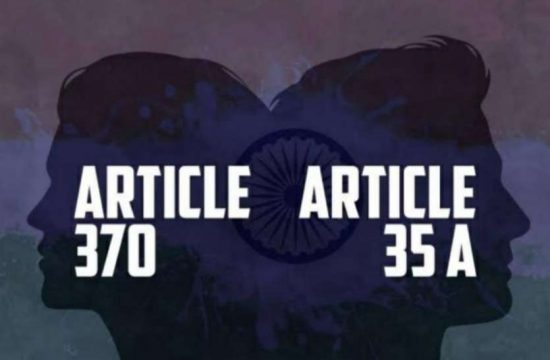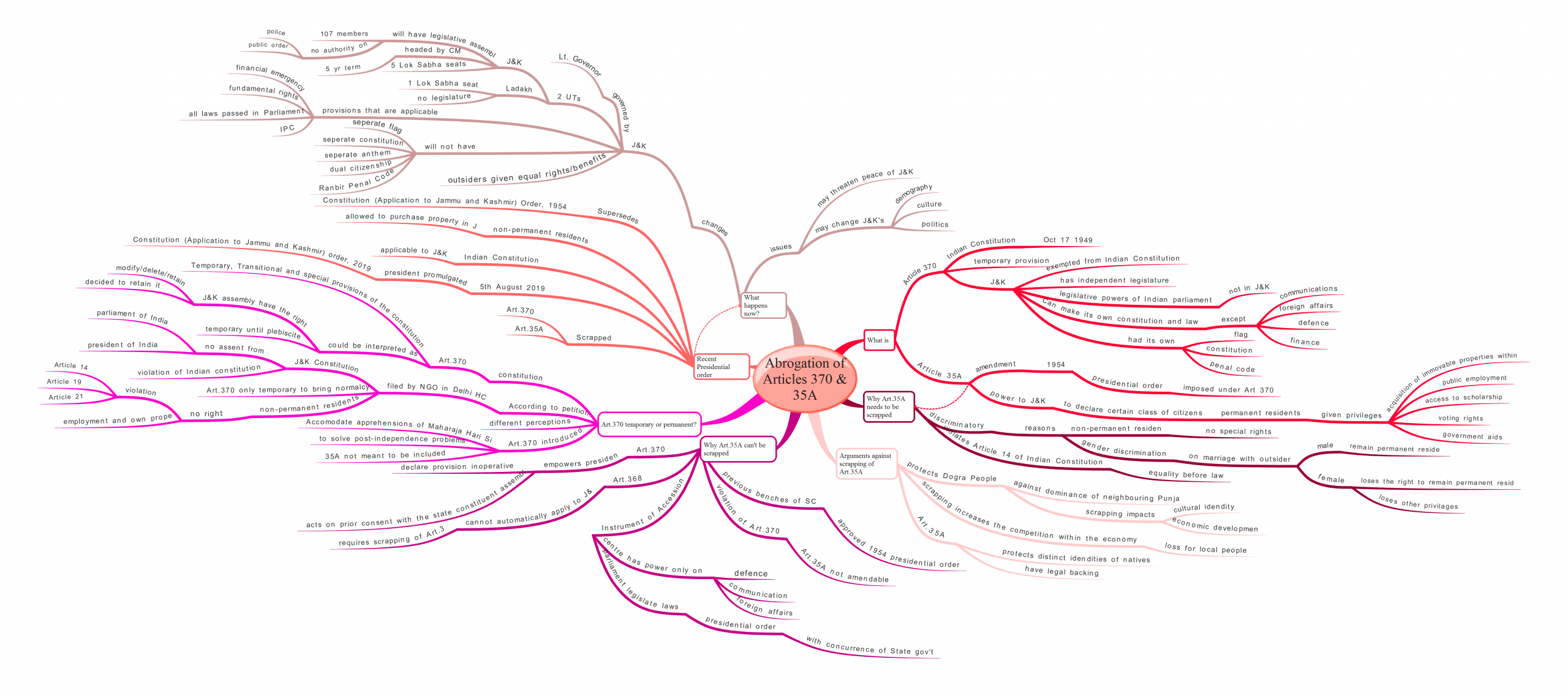Abrogation of Article 370 & 35A of Constitution – Explained

Updates *
On 5th of August 2019, the President of India promulgated the Constitution (Application to Jammu and Kashmir) Order, 2019. It revokes the special status given to Jammu & Kashmir under Article 370 and Article 35A.
A separate Bill – the Jammu and Kashmir Reorganisation Bill 2019 – was introduced to bifurcate the State into two separate union territories of Jammu and Kashmir (with legislature), and Ladakh (without legislature).
Jammu and Kashmir Reservation (Second Amendment) Bill, 2019 was also introduced to extend the reservation for Economically Weaker Sections (EWS) in educational institutions and government jobs in Jammu and Kashmir.
What is Article 370?
- Article 370 was included in the Indian Constitution on October 17, 1949, as a ‘temporary provision’, which exempts Jammu and Kashmir from the Indian Constitution = allows it to draft its own Constitution and restricting the Indian Parliament’s legislative powers in the state.
- In short, it accorded special status to the state, giving the J&K legislature free rein to draft its own laws, except in the areas of communications, defence, finance, and foreign affairs.
- As a result, Jammu and Kashmir had its own constitution, flag, and penal code.
What is Article 35A?
- Article 35A was inserted as part of amendments made through a 1954 presidential order imposed under Article 370 of the constitution.
- It gives powers to J&K to declare a class of persons as “permanent residents’ of the State
- It also empowers the government to give such persons special rights and privileges in matters of
- Public employment
- Acquisition of immovable property in the State
- Settlement in different parts of the State.
- Access to scholarships
- Voting rights
- Other such aids that the State government might provide.
- Legislations to confer special rights and privileges are exempt from being annulled on the ground that they infringe on any of the fundamental rights provided under the Indian Constitution.
Why Article 35A needs to be scrapped?
- However, this immunity granted to J&K’s laws are considered as discriminatory due to the following reasons
- Non-permanent residents are denied all the special rights.
- Discrimination based on gender because a male resident in J&K will not lose the right of being a permanent resident even after marriage to a woman from outside. But it is the opposite for woman and they will lose the right of being a permanent resident on marrying an outsider. It discriminates against women who marry outside the state from applying for jobs or buying a property.
- Thus Article 35A is considered to be violating Article 14 of the constitution which provides for equality before the law and equal protection of the laws, thus affecting the basic structure of the constitution.
- Therefore the petition challenges the constitutional validity of Article 35A.
What are the Arguments against scrapping Article 35A?
- Article 35A is more relevant for the Dogra people of Jammu as it protects them from domination by elite and affluent outsiders mostly from neighboring Punjab. Repealing the Article would likely impact the cultural identity and economic opportunities of those communities.
- Article 35A is required to promote the industrial development of J&K since it imposes restrictions on non-permanent residents to carry on business in the State.
- Also, the repeal of the law would lead to loss of opportunities due to the increased competition for recruitment, scholarships and other financial assistance. It will also increase pressure on landholdings, farm activity, etc. This may result in loss of opportunities for the local skilled and unskilled labour, farmers, etc.
- Moreover, Article 35A safeguards the rights and the distinct identity of the J&K people. Arguments for removing the law would only make it difficult for them to integrate with the nation as a whole.
- Apart from these arguments, there are the legal obstacles as mentioned before, there are various other arguments opposing the scrapping of Article 35A as follows.
Why can Article 35A not be scrapped?
- The law on the subject is well settled as previous benches of the Supreme Court have already approved the 1954 presidential order.
- Article 35A is not amendable based on basic structure violation since Article 370 gave J&K a set of special privileges. This includes an exemption from constitutional provisions governing other states.
- As per the J&K Instrument of Accession (signed between the erstwhile ruler of the Kashmir and Government of India in 1947),
- Parliament’s powers to legislate over the State are restricted to 3 core subjects viz- defence, foreign affairs, and communications.
- Parliament could legislate on other areas only through a presidential order and that too with the prior concurrence of the State government.
- However, Article 370 of the constitution empowers the President to declare the provision inoperative. But his authority can only be exercised on the prior consent of the State’s Constituent Assembly.
- Even amendments made to the Constitution under Article 368 will not automatically apply to J&K as it requires specific order to be made under Article 370. That too requires J&K government’s prior assent and ratification by the State’s Constituent Assembly.
- Therefore, as long as Article 370 exists, we cannot justify the validity of Article 35A.
Was Article 370 temporary or permanent?
There are several interpretations to Article 370 being temporary or permanent based on opinions of constitution experts, court judgements and PIL petitions as follows.
- A petition was filed by an NGO challenged the validity of Article 370 against the Delhi High Court’s April 11, 2017 order. The petition said that the continuance of the temporary provision of Article 370 even after the dissolution of the Constituent Assembly of J&K, and that of J&K Constitution which has never got the assent of the President of India or Parliament or the government of India, “amounts to fraud on the basic structure of our Constitution”.
- Besides, it argued that Article 370 was only a ‘temporary provision’ to help bring normalcy in Jammu and Kashmir and strengthen democracy in that State.
- The Article was introduced to accommodate the apprehensions of Maharaja Hari Singh who would not have acceded to India without certain concessions.
- Territorial integrity was of paramount importance to India post-independence, thus, such a special provision was inducted in the constitution.
- The Constitution makers did not intend Article 370 to be a tool to bring permanent amendments, like Article 35A, in the Constitution. Therefore it is incorporated as a part of the “Temporary, Transitional and Special Provisions” of our constitution.
- The plea said Article 35 A is against the “very spirit of oneness of India” as it creates a “class within a class of Indian citizens”.
- Restricting citizens from other States from getting employment or buying property within Jammu and Kashmir is a violation of fundamental rights under Articles 14, 19 and 21 of the Indian Constitution.
- Moreover, Article 370 could be interpreted as temporary in the sense that the J&K Constituent Assembly had a right to modify/delete/retain it. But it decided to retain it.
- Another interpretation was that accession was temporary until a plebiscite is made.
What is the recent presidential order?
On 5th of August 2019, the President of India promulgated the Constitution (Application to Jammu and Kashmir) Order, 2019. It revokes the special status given to Jammu & Kashmir under Article 370 and Article 35A.
- The order effectively revokes the special status accorded to Jammu and Kashmir under the provision of Article 370 – whereby provisions of the Constitution which were applicable to other states were not applicable to Jammu and Kashmir (J&K) = The provisions of the Indian Constitution are now applicable in the State.
- It will also clear the path for abrogating Article 35A which would allow Indian citizens to purchase land and settle permanently in J&K.
- This Order comes into force “at once”, and shall “supersede the Constitution (Application to Jammu and Kashmir) Order, 1954.”
What happens now?
Though the Presidential Order may face legal scrutiny, as matters currently stand, Jammu and Kashmir will witness historic political and geographic changes. It is to be divided into two union territories-Ladakh and Jammu and Kashmir.
- Ladakh will not have a legislature, while Jammu and Kashmir will have a legislative assembly with 107 members-however, this assembly will not have the authority to pass laws relating to ‘public order and the police’.
- The single largest party in the assembly will form the government, headed by a chief minister, and the assembly will have a five-year term, not six, as was the earlier case.
- A Lieutenant Governor will govern both Union territories.
- Of the six Lok Sabha seats currently with the state of Jammu and Kashmir, five will remain with the union territory of Jammu and Kashmir, while one will go to Ladakh.However, the biggest fallout for the state will stem from the abolition of its special status under Article 370. These are the likely major changes:
- Jammu and Kashmir will no longer have separate constitution, flag or anthem.
- The citizens of Jammu and Kashmir will not have dual citizenship-they will be citizens of India alone.
- As the new union territory of Jammu and Kashmir will be subject to the Indian Constitution, its citizens will now have the Fundamental Rights enshrined in that document-until now, this was not the case.
- Article 360, which can be used to declare a Financial Emergency, will now also be applicable.
- All laws passed by Parliament will be applicable in Jammu and Kashmir, including the Right to Information Act and the Right to Education Act.
- The Indian Penal Code will replace the Ranbir Penal Code of Jammu and Kashmir
- As the government has modified the Article 370, diluting special status to Jammu and Kashmir, Article 35 (A), which originates from the provisions of Article 370 stands null and void.
- Any Indian citizen from any part of the country can now buy property in Jammu and Kashmir, take a state government job and enjoy scholarships and other government benefits.
- Children of a woman marrying outside Jammu and Kashmir will not lose property rights.
What are the issues with the order?
Article 370 is the bedrock of the constitutional relationship between Jammu and Kashmir and the rest of India.
- It has been described as a tunnel through which the Constitution is applied to J&K.
- India has used Article 370 at least 45 times to extend provisions of the Indian Constitution to J&K. This is the only way through which, by mere Presidential Orders, India has almost nullified the effect of J&K’s special status.
- By the 1954 order, almost the entire Constitution was extended to J&K including most Constitutional amendments.
- However, abrogating the article altogether may threaten the peace in the state which is already a hotspot of conflicts and militancy.
- It will completely change the relationship between the state and the rest of India.
It will also clear the path for abrogating Article 35A which would allow Indian citizens to purchase land and settle permanently in J&K = This move is bound to have a significant impact on the demography, culture, and politics of J&K.
J&K Reorganisation Act 2019: Key Features *
If you like this post, please share your feedback in the comments section below so that we will upload more posts like this.



